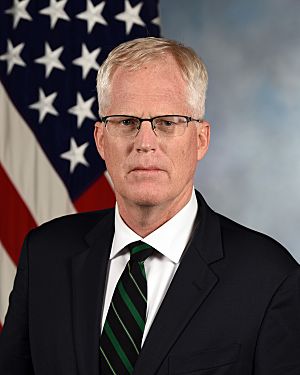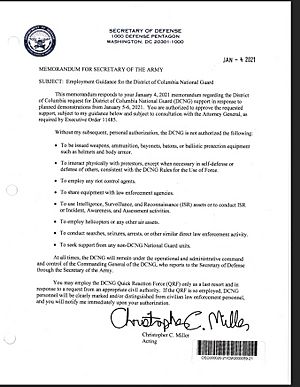Christopher C. Miller facts for kids
Quick facts for kids
Christopher C. Miller
|
|
|---|---|

Official portrait, 2020
|
|
| United States Secretary of Defense | |
| Acting November 9, 2020 – January 20, 2021 |
|
| President | Donald Trump |
| Preceded by | Mark Esper |
| Succeeded by | David Norquist (acting) |
| Director of the National Counterterrorism Center | |
| In office August 10, 2020 – November 9, 2020 |
|
| President | Donald Trump |
| Preceded by | Joseph Maguire |
| Succeeded by | Steve Vanech (acting) |
| Assistant Secretary of Defense for Special Operations and Low-Intensity Conflict | |
| Acting June 19, 2020 – August 10, 2020 |
|
| President | Donald Trump |
| Preceded by | Thomas Alexander (acting) |
| Succeeded by | Ezra Cohen-Watnick (acting) |
| Personal details | |
| Born |
Christopher Charles Miller
October 15, 1965 Platteville, Wisconsin, U.S. |
| Spouse |
Kathryn Maag
(m. 1989) |
| Children | 3 |
| Education |
|
| Military service | |
| Allegiance | United States |
| Branch/service | United States Army |
| Years of service | 1983–2014 |
| Rank | Colonel |
| Unit | 5th Special Forces Group Intelligence Support Activity |
| Battles/wars | War in Afghanistan Iraq War |
Christopher Charles Miller (born October 15, 1965) is an American who served in important government roles. He was the acting United States Secretary of Defense from November 2020 to January 2021. This means he was in charge of the entire U.S. military during that time. Before this, he was the Director of the National Counterterrorism Center, which works to stop terrorism.
Before his government jobs, Miller was a Green Beret in the U.S. Army. He led special forces units in places like Afghanistan and Iraq. After leaving the military, he worked as a defense contractor.
Miller's time in the government began when he became the Director of the National Counterterrorism Center in August 2020. President Donald Trump then made him the acting Secretary of Defense in November 2020. This happened after the previous Secretary, Mark Esper, left the role.
Contents
Early Life and Education
Christopher Miller was born in Platteville, Wisconsin, on October 15, 1965. He grew up in Iowa City, Iowa, starting in 1975. His mother, Lois Maxine Miller, was a teacher at the University of Delaware. His father, Harvey Dell Miller, was the police chief of Iowa City for 13 years. Miller has said his father strongly believed in serving the public.
Miller went to Iowa City High School. He later earned a Bachelor of Arts degree in history from George Washington University in 1987. He also received a Master of Arts degree in national security studies from the Naval War College in 2001. He also studied at the College of Naval Command and Staff and the United States Army War College.
Military Career
Miller served in the U.S. military for many years, from 1983 to 2014. He started as an enlisted soldier in the Army Reserve. In 1987, he became an officer. He joined the Special Forces in 1993.
As a major, Miller led a company in the 5th Special Forces Group during the United States invasion of Afghanistan. He was part of a team that responded quickly to an incident where friendly forces were accidentally hit. During his military career, Miller was sent to Afghanistan and Iraq several times. He commanded Special Forces units in Iraq in 2006 and 2007. He was promoted to colonel in December 2009.
One of his last jobs in the Army was working at the Pentagon in 2011. There, he helped oversee special operations and irregular warfare.
Civilian Work Before Defense Secretary
After leaving the military in 2014, Miller worked for companies that help the military. In 2017, he started working for the government again, inspecting intelligence activities. In 2018, he joined the United States National Security Council, which advises the President on security matters. He worked on efforts against terrorist groups there.
In 2020, he became a deputy assistant secretary of defense. In this role, he helped identify threats to the United States, such as certain countries and domestic terrorism.
President Trump nominated Miller to lead the National Counterterrorism Center in March 2020. He officially started this job on August 10, 2020.
Acting Secretary of Defense
On November 9, 2020, Christopher Miller was appointed as the acting United States Secretary of Defense. This happened after Mark Esper was no longer in the role. At this time, President Trump was in his final months in office.
Miller's chief of staff as acting secretary was Kash Patel.
Decisions on U.S. Forces
In November 2020, Miller traveled to the Middle East and Africa to visit military units. He said he wanted to meet with troops during the Thanksgiving holiday.
During his time as acting Secretary, decisions were made to reduce the number of U.S. forces in Afghanistan, Iraq, and Somalia. Some people disagreed with these decisions. They worried that reducing troops could harm efforts to fight terrorism. They also pointed out that Miller said the U.S. was "on the verge of defeating al-Qa'ida" but also said "Now, it's time to come home."
Presidential Transition
On December 18, 2020, Miller ordered the Pentagon to delay some meetings with the team of incoming President Joe Biden. Miller said this was a "mutually agreed-upon holiday pause." However, Biden's team said they had not agreed to such a pause. This decision came as President Trump had not yet accepted the election results.
Events of January 6, 2021
On January 3, 2021, ten former defense secretaries wrote a public letter. They shared concerns about the military's role in the election results. They warned officials, including Miller, to follow the Constitution.
Miller later testified about a conversation he had with President Trump on January 3. Miller said he told the President that Washington, D.C., Mayor Muriel Bowser had asked for unarmed personnel to help local police. Miller said Trump responded, "Fill it and do whatever was necessary to protect the demonstrators."
On January 5, Miller gave orders that limited how the D.C. National Guard could be used. They were not allowed to have weapons, helmets, or body armor without his personal approval. The commanding general of the D.C. National Guard, Maj. Gen. William J. Walker, later said he did not have the usual authority to respond immediately to protect property or lives.
Miller's actions on January 6 were closely looked at. After people broke into the Capitol building, Miller waited more than three hours before allowing the National Guard to be sent in. He gave permission at 4:32 p.m. Miller later said he wanted to avoid a situation like the Kent State shootings, where students were shot during a protest.
Miller testified that President Trump told him to give D.C. Mayor Bowser any support she asked for. Trump also thought they might need 10,000 troops on January 6. However, Miller said Trump never gave him a formal order to have 10,000 troops ready. Miller stated, "There was no direct, there was no order from the President."
Miller also said he did not speak with Trump at all during the Capitol attack. He felt he had "all the authority I needed" to act. Miller believes the Pentagon responded well. He later realized there might have been an "organized conspiracy" before Trump spoke on January 6. Miller also acknowledged that a communication problem might have happened. He ordered the National Guard to be "mobilized" but not immediately "deployed," which might have caused delays.
Final Comments as Secretary
In an interview on January 14, 2021, Miller spoke about Russia's military. He also criticized some Pentagon programs, like the F-35 Joint Strike Fighter. He said he was looking forward to leaving his job.
Miller supported new ideas for the Defense Department to handle conflicts in different ways. He believed this was the future for the department.
After the Trump Administration
In February 2023, Miller published a book called Soldier Secretary: Warnings from the Battlefield & the Pentagon About America's Most Dangerous Enemies. In his book, Miller suggested that the U.S. military budget could be cut significantly, back to levels before the 9/11 events.
In 2023, Miller wrote a chapter for a book by The Heritage Foundation called Mandate for Leadership. This book provides policy ideas for a project called Project 2025.
Personal Life
Christopher Miller married Kathryn Maag Miller on September 16, 1989. She works as an office manager for a group that works on health and environment issues. They have three children.
See also
 In Spanish: Christopher C. Miller para niños
In Spanish: Christopher C. Miller para niños
 | Sharif Bey |
 | Hale Woodruff |
 | Richmond Barthé |
 | Purvis Young |


